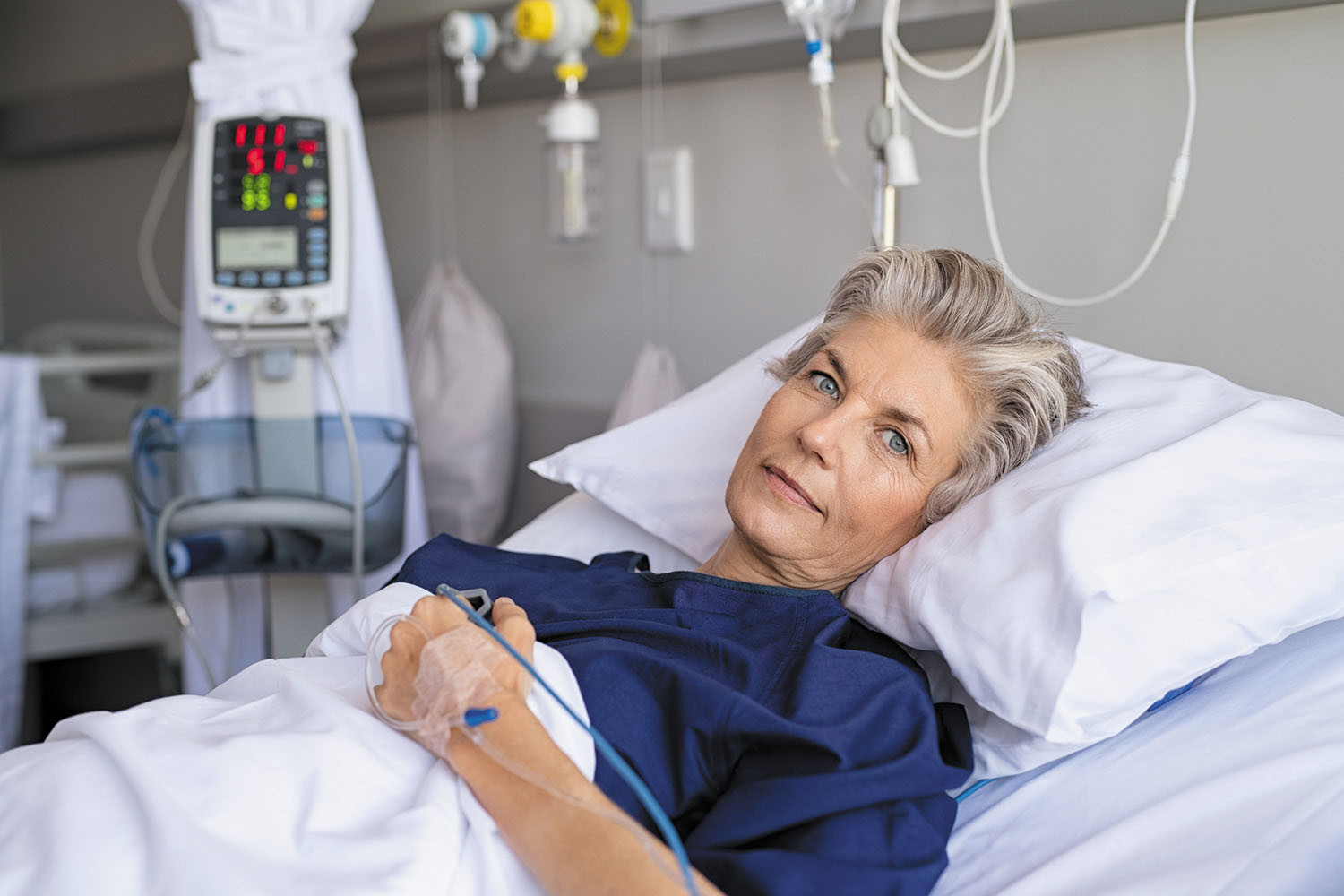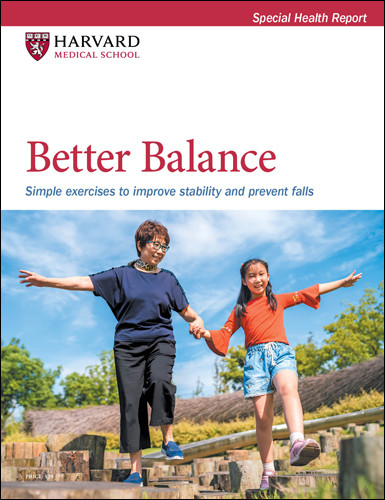Staying safe while getting well
Adverse events — many of them potentially preventable — can leave hospital patients vulnerable. How can you protect yourself?
- Reviewed by Toni Golen, MD, Editor in Chief, Harvard Women's Health Watch; Editorial Advisory Board Member, Harvard Health Publishing; Contributor

You're ensconced in a hospital bed, surrounded by dedicated doctors and nurses and relieved to be recovering in a place whose mission is to get you well.
But are you safe? That may seem like a strange question when you're in a facility intended to restore your health or even save your life.
More than 33 million people were admitted to the nation's 6,000 hospitals in 2022, according to the American Hospital Association. About 13 million of them were 65 or older. All of them showed up there at a vulnerable moment, trusting they'd be cared for safely.
But sometimes things go wrong. Despite the best efforts of your medical team, adverse events and medical errors can happen.
"Hospitals are not as safe as they could be," says Dr. David Bates, chief of the Division of Medicine at Harvard-affiliated Brigham and Women's Hospital and director of its Center for Patient Safety Research and Practice.
"It's certainly unsettling," adds Dr. Bates, who led a study looking at adverse medical events during hospitalizations, published online Jan. 12, 2023, by The New England Journal of Medicine. "That being said, there are certain strategies patients and their families can take to protect themselves."
What can go awry?
Dr. Bates's efforts — which largely replicated a 1991 Harvard analysis — also showed that hospital-related adverse events happen up to 10 times more often than they did 30 years ago, though the study design and some definitions of harm differed. "I was surprised there is as much harm as there is," he says.
He and colleagues analyzed a random sample of 2,809 patient admissions at 11 Massachusetts hospitals in 2018. Preventable medical events occurred in nearly 7% of all admissions, while serious and potentially life-threatening preventable events arose in 1%.
What constitutes a medical adverse event? Examples include patients receiving the wrong medication or dose, getting a new infection while in the hospital, developing bed sores, or falling.
"Preventable adverse events typically happen because someone makes a mistake, or more than one, in the process of care," Dr. Bates says. "I think a lot of it is just the pressures of giving care today."
Various hospital protocols are often able to identify these problems before a patient is harmed. "At the same time, while we have better equipment now, sometimes the risk of what we do has simply gone up," Dr. Bates says. "We now do surgery for more serious problems and have more powerful medications, so it is not surprising to see some adverse events."
Want to stay out of the hospital? Exercise a bit moreIf an apple a day keeps the doctor away, what can an extra dose of daily exercise accomplish? It may keep you out of the hospital, according to a new analysis. Adding 20 minutes of moderate-to-vigorous physical activity — including walking, cycling, or swimming — to your daily routine can cut your risk of being hospitalized for a variety of common medical problems, the study suggests. The study, published online Feb. 16, 2023, by JAMA Network Open, used data from nearly 82,000 U.K. adults (average age 62, 56% women) who wore an activity tracker for one week. Over the following seven years, those who'd shown greater levels of physical activity — particularly moderate-to-vigorous exercise — were less likely to be hospitalized for nine of the 25 most common reasons people are typically admitted: diabetes, gallbladder disease, urinary tract infections, stroke, pneumonia, blood clots, anemia, diverticular disease, and colon polyps. How might exercise promote this effect? Some likely reasons are that it helps us control weight and blood pressure as well as improve inflammation levels and immune response. "With diabetes, for example, it's clear that blood sugar control is better if people are getting more physical activity," says Dr. David Bates, chief of the Division of Medicine at Brigham and Women's Hospital. "For conditions such as blood clots and pneumonia, if you're more active, the risk is also lower." "The very safest thing to do is stay out of the hospital," he adds. "More and more, we know that physical activity is strongly associated with better outcomes across a range of factors." |
Protection strategies
The fallout from an adverse hospital event can affect a patient's physical, mental, and financial health. You may end up staying in the hospital longer or facing a prolonged recovery at home. Depression is often part of the aftermath, Dr. Bates notes, "and the older you are, the more likely you'll experience an adverse event and that it will affect you psychologically."
While adverse events often aren't preventable — and they're rarely the fault of the patient — Dr. Bates offers ways your own vigilance might reduce the odds of you suffering from a mishap.
Get a care partner. Ask your spouse, adult child, or another loved one to remain close at hand while you're hospitalized. This trusted person can serve as a second set of eyes and ears and is particularly valuable if you're too sick to keep tabs on the care you're getting. "Ideally they'd always be there, but the more they can be, the better," Dr. Bates says.
Track your medications. It's crucial to know which drugs you usually take and what they're for. It's also especially valuable if a family member can help sort out any questions about new or unfamiliar medications — or the discontinuation of something you've been taking. "Your medication list will likely change quite a bit during your hospitalization, so you want to keep a list you came in with and a list you leave with," he says.
Understand your fall risk. Your care team should review which situations may increase your risk of falling and let you know when you should push a call button for help. "Often, what happens in the hospital can make you weak to an extent you don't expect," Dr. Bates says. "You may get up when you shouldn't, or get up without help, and go down unnecessarily."
Move around if you can. There's a reason hospital staff gets you out of bed quickly after surgery, whenever possible. Moving your body within 24 hours of surgery — transferring from bed to chair, rising from a chair, exercising in or out of bed, sitting in a chair rather than bed to eat your meals, or walking the hallways — helps maintain muscle strength, lowers the risk of postoperative complications, and reduces the length of patients' hospital stays, according to a 2022 study in the Journal of Comparative Effectiveness Research.
Image: © Ridofranz/Getty Images
About the Author

Maureen Salamon, Executive Editor, Harvard Women's Health Watch
About the Reviewer

Toni Golen, MD, Editor in Chief, Harvard Women's Health Watch; Editorial Advisory Board Member, Harvard Health Publishing; Contributor
Disclaimer:
As a service to our readers, Harvard Health Publishing provides access to our library of archived content. Please note the date of last review or update on all articles.
No content on this site, regardless of date, should ever be used as a substitute for direct medical advice from your doctor or other qualified clinician.
















